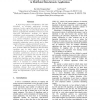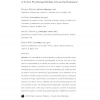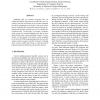874 search results - page 6 / 175 » On Advantages of Grid Computing for Parallel Job Scheduling |
MIDDLEWARE
2007
Springer
14 years 1 months ago
2007
Springer
Recent research in multi-site parallel job scheduling leverages user-provided estimates of job communication characteristics to effectively partition the job across multiple clus...
HPDC
2002
IEEE
14 years 17 days ago
2002
IEEE
In high energy physics, bioinformatics, and other disciplines, we encounter applications involving numerous, loosely coupled jobs that both access and generate large data sets. So...
HPCC
2007
Springer
14 years 1 months ago
2007
Springer
Many optimization techniques have been adopted for efficient job scheduling in grid computing, such as: genetic algorithms, simulated annealing and stochastic methods. Such techni...
GRID
2007
Springer
13 years 7 months ago
2007
Springer
It is often difficult to perform efficiently a collection of jobs with complex job dependencies due to temporal unpredictability of the grid. One way to mitigate the unpredictabili...
CCGRID
2002
IEEE
14 years 17 days ago
2002
IEEE
Malleable jobs are parallel programs that can change the number of processors on which they are executing at run time in response to an external command. One of the advantages of ...



